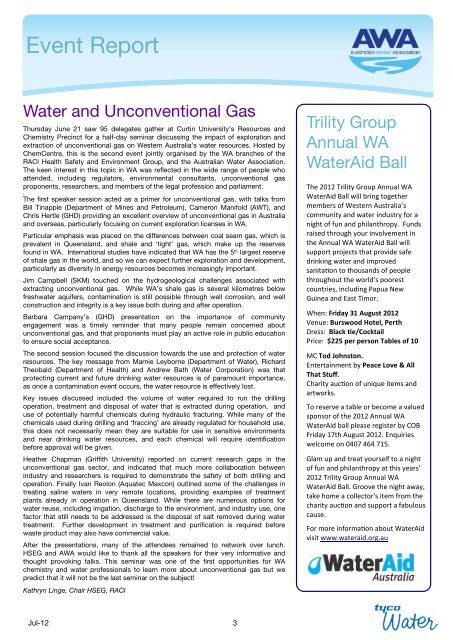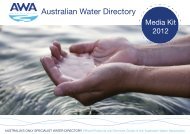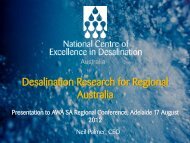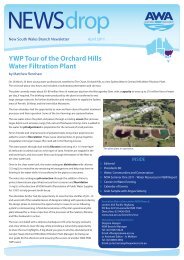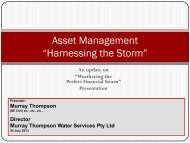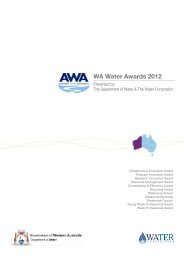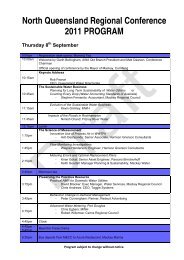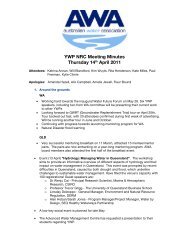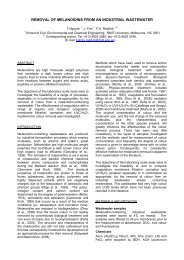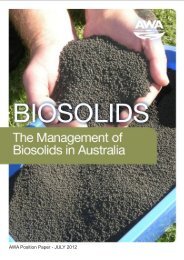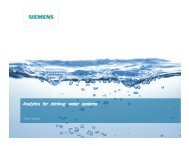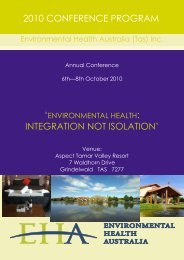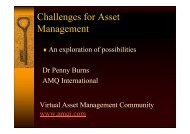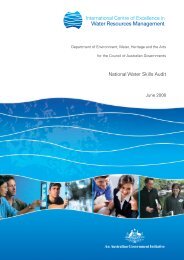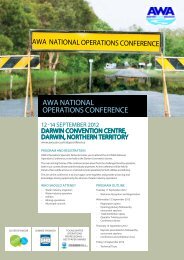Thoughts from your WA President - Australian Water Association
Thoughts from your WA President - Australian Water Association
Thoughts from your WA President - Australian Water Association
You also want an ePaper? Increase the reach of your titles
YUMPU automatically turns print PDFs into web optimized ePapers that Google loves.
Event Report<strong>Water</strong> and Unconventional GasThursday June 21 saw 95 delegates gather at Curtin University’s Resources andChemistry Precinct for a half-day seminar discussing the impact of exploration andextraction of unconventional gas on Western Australia’s water resources. Hosted byChemCentre, this is the second event jointly organised by the <strong>WA</strong> branches of theRACI Health Safety and Environment Group, and the <strong>Australian</strong> <strong>Water</strong> <strong>Association</strong>.The keen interest in this topic in <strong>WA</strong> was reflected in the wide range of people whoattended, including regulators, environmental consultants, unconventional gasproponents, researchers, and members of the legal profession and parliament.,The first speaker session acted as a primer for unconventional gas, with talks <strong>from</strong>Bill Tinapple (Department of Mines and Petroleum), Cameron Manifold (AWT), andChris Hertle (GHD) providing an excellent overview of unconventional gas in Australiaand overseas, particularly focusing on current exploration licenses in <strong>WA</strong>.Particular emphasis was placed on the differences between coal seam gas, which isprevalent in Queensland, and shale and ‘tight’ gas, which make up the reservesfound in <strong>WA</strong>. International studies have indicated that <strong>WA</strong> has the 5 th largest reserveof shale gas in the world, and so we can expect further exploration and development,particularly as diversity in energy resources becomes increasingly important.Jim Campbell (SKM) touched on the hydrogeological challenges associated withextracting unconventional gas. While <strong>WA</strong>’s shale gas is several kilometres belowfreshwater aquifers, contamination is still possible through well corrosion, and wellconstruction and integrity is a key issue both during and after operation.Barbara Campany’s (GHD) presentation on the importance of communityengagement was a timely reminder that many people remain concerned aboutunconventional gas, and that proponents must play an active role in public educationto ensure social acceptance.The second session focused the discussion towards the use and protection of waterresources. The key message <strong>from</strong> Marnie Leyborne (Department of <strong>Water</strong>), RichardTheobald (Department of Health) and Andrew Bath (<strong>Water</strong> Corporation) was thatprotecting current and future drinking water resources is of paramount importance,as once a contamination event occurs, the water resource is effectively lost.Key issues discussed included the volume of water required to run the drillingoperation, treatment and disposal of water that is extracted during operation, anduse of potentially harmful chemicals during hydraulic fracturing. While many of thechemicals used during drilling and ‘fraccing’ are already regulated for household use,this does not necessarily mean they are suitable for use in sensitive environmentsand near drinking water resources, and each chemical will require identificationbefore approval will be given.Heather Chapman (Griffith University) reported on current research gaps in theunconventional gas sector, and indicated that much more collaboration betweenindustry and researchers is required to demonstrate the safety of both drilling andoperation. Finally Ivan Reolon (Aquatec Maxcon) outlined some of the challenges intreating saline waters in very remote locations, providing examples of treatmentplants already in operation in Queensland. While there are numerous options forwater reuse, including irrigation, discharge to the environment, and industry use, onefactor that still needs to be addressed is the disposal of salt removed during watertreatment. Further development in treatment and purification is required beforewaste product may also have commercial value.After the presentations, many of the attendees remained to network over lunch.HSEG and A<strong>WA</strong> would like to thank all the speakers for their very informative andthought provoking talks. This seminar was one of the first opportunities for <strong>WA</strong>chemistry and water professionals to learn more about unconventional gas but wepredict that it will not be the last seminar on the subject!Kathryn Linge, Chair HSEG, RACITrility GroupAnnual <strong>WA</strong><strong>Water</strong>Aid BallThe 2012 Trility Group Annual <strong>WA</strong><strong>Water</strong>Aid Ball will bring togethermembers of Western Australia’scommunity and water industry for anight of fun and philanthropy. Fundsraised through <strong>your</strong> involvement inthe Annual <strong>WA</strong> <strong>Water</strong>Aid Ball willsupport projects that provide safedrinking water and improvedsanitaon to thousands of peoplethroughout the world’s poorestcountries, including Papua NewGuinea and East Timor.When: Friday 31 August 2012Venue: Burswood Hotel, PerthDress: Black e/CocktailPrice: $225 per person Tables of 10MC Tod Johnston.Entertainment by Peace Love & AllThat Stuff.Charity aucon of unique items andartworks.To reserve a table or become a valuedsponsor of the 2012 Annual <strong>WA</strong><strong>Water</strong>Aid ball please register by COBFriday 17th August 2012. Enquirieswelcome on 0407 464 715.Glam up and treat <strong>your</strong>self to a nightof fun and philanthropy at this years'2012 Trility Group Annual <strong>WA</strong><strong>Water</strong>Aid Ball. Groove the night away,take home a collector's item <strong>from</strong> thecharity aucon and support a fabulouscause.For more informaon about <strong>Water</strong>Aidvisit www.wateraid.org.auJul-123


